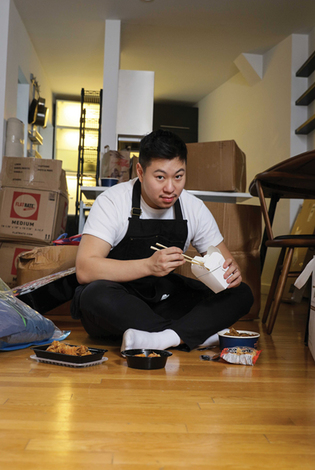
Chris Cassidy
Lucas Sin ’15, pictured in his recently acquired New York City apartment, relocated to China in 2022 for a better understanding of the foods he loves. A chef, YouTube regular, and restaurateur, Sin is writing a book on Hong Kong diner food. He expects to return to NYC once it’s finished.
View full image
Lucas Sin ’15 was born in 1993 in Canada and grew up in a food-minded family that moved between Canada, California, and Hong Kong. He graduated from Yale in 2015, opened several restaurants in New Haven and New York City then in 2022 he moved to mainland China, where he’d never lived, to “see what it was like.” He hosts a popular Bon Appétit video series on street food that began in April 2023 and filmed an episode for National Geographic’s Best of the World 2024 on a unique sushi restaurant in Tokyo. He’s now completing a book on Hong Kong diners.
Corby Kummer: You were a successful food entrepreneur as an undergraduate, and quickly turned that into a successful string of restaurants in New Haven and New York City. Why uproot yourself to live in China?
Lucas Sin: For a chef it’s a gold mine. It’s the richest and most diverse culinary landscape in the universe. I always feel I’m only scratching the surface learning about Chinese food.
CK: Was your family particularly food-minded?
LS: Food is very engraved in the culture of Hong Kong. Technically my grandmother was a chef. She came down from China to work. Like most in that generation, they cooked because there was nothing else to do or that they could do. A lot of time eating as kids, a lot of meals were a series of questions to feed our curiosity: How is this made, who is the person who made it, why did they do it that way, why did this dish come to be. My dad is a really good home cook, in my opinion the best home cook in the world. He worked in tech and education and teaches entrepreneurship now at several universities in Hong Kong. His mother was the chef. My mother hated cooking but cooked reluctantly and a lot.
CK: Did Yale encourage your interest in food?
LS: The style of study was very open. It could be driven by a person’s curiosity. My major was in cognitive science: philosophy, neuroscience, translating Chinese to English, some modern poetry, all very fun. I didn’t take any food classes but I knew I was interested in it.
When I was here, I did a Y Pop-Up, a student-run restaurant that would change concept at least once every semester. The first was in my room in Davenport serving noodles. Computer friends coded the reservation system. By the time I left we’d done five distinct, fully fledged restaurant concepts in the basements of Dport, Stiles, and in JE. We were a bunch of kids cosplaying how to open a restaurant—the way all restaurants work. A lot of people had never held a broom before. The last time I talked to anyone at Yale Daily News they said the Y Pop-Up still exists and is incredibly competitive.
After graduation I opened Junzi Kitchen with three other Yalies doing graduate programs, all of them Chinese. It was across from D-port on Broadway. I pretended I knew what I was doing. Then we started Nice Day in New York City, offering new takes on Chinese-American food. I was involved in operations for both restaurants until 2022.
CK: Then you moved to China. Why?
LS: I did a lot of media during COVID though I thought I was camera shy. I’m now known as a YouTube guy. I host a street food show for Bon Appétit. As someone who makes Chinese food, I wanted to be close to it. That led me to live in China and work on a book about Hong Kong food, especially diner food. It’s where my heart is.
The food that really excites me is what’s served in Hong Kong diners—a unique genre called cha chaan teng. All-day food like scrambled eggs and milk tea. They’re democratic restaurants with a comparatively short 70-year history combining east and west, made by and for Hong Kong people as the interpretation of many outside cultures including British. It’s very delicious and accessible. There’s a deep nostalgia for this kind of food.
CK: How long will you stay in China?
LS: I’m excited about bringing parts of Hong Kong to the US that are near and dear to my heart. We’ll move back sometime after I finish the book. My girlfriend is American, with zero Chinese parentage, and she fell in love with local hospitality and the food scene in Shanghai, where we live. Now she speaks Chinese and has opened many restaurants in Shanghai. Restaurants really suffered during COVID though, with a different trajectory from the US. They’re still recovering, but the scene is really exciting.
The thing about China is that things move so quickly. If you don’t go when you’re interested you won’t see it again. The pace of change is ridiculous. It’s really impressive.
 loading
loading